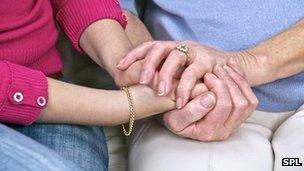Isolated cancer patients in Wales refusing treatment, says report
- Published
Former AM Karen Sinclair says no-one should face cancer alone
Almost one in five people in Wales diagnosed with cancer each year say they lack support from family and friends, a charity claims.
A report from Macmillan Cancer Support reveals that more than half of health professionals say they have patients who refuse treatment because of this.
Former AM Karen Sinclair, who has cancer, was "saddened" by the findings.
"There are people out there who are facing this alone and they shouldn't have to," she said.
Macmillan's report, Facing the Fight Alone, looked at the number, profile and experiences of isolated people living with cancer.
It estimated that 3,420 people - 19% - of the 18,000 newly diagnosed cancer patients each year said they lacked support from family and friends.
More than half of health professionals - 53% - have had patients choose not to have treatment because they felt they did not have the support.
'Tip of the iceberg'
Susan Morris, general manager for Macmillan Cancer Support in Wales, said: "This research shows that isolation can have a truly shattering impact on people living with cancer.
"Patients are going hungry, missing medical appointments and even deciding to reject treatment altogether which could be putting their lives at risk, all because of a lack of support."
She said these figures were the tip of the iceberg.
"As the number of people living with cancer in Wales is set to double from 120,000 to 240,000 by 2030, isolation will become an increasing problem and we need to address this now," she added.
"That's why we are launching a new campaign to help tackle this crisis and to ensure that in future, no-one faces cancer alone."
She added: "We know of people, from a survey we've done by professionals, who said they've actually turned down treatment because they didn't think they would be able to cope with the demands of the treatment without that support around them.
"And we know if you're tired and can't prepare a hot meal for yourself, or can't take care of yourself in the same way, that's really tough and it can affect the outcome of the treatment as well.
"We know we live much busier lives these days and perhaps families don't have the same time for each other that they did."
'Loneliness'
Despite the love of a devoted family, Karen Sinclair knows how desperately isolating fighting cancer can be.

More than half of health professionals have had patients choose not to have treatment
The 60-year-old former Labour AM for Clwyd South, who will never be cured, endured 18 months of treatment that "poisoned" her body and wiped out her immune system.
There were weeks where she was cut off from family and friends for fear of infection.
It was during these darkest moments Mrs Sinclair, from Llangollen, felt the loneliness of the disease.
She said: "When I could not see people I was isolated, I could not work, go out and meet people - my life had disappeared."
"I was saddened to see the percentage of people who face treatment alone or don't even have treatment - it makes me so sad because there's help out there."
Mrs Sinclair was diagnosed with multiple myelomas, which is when a collection of abnormal plasma cells accumulate in the bone marrow, in 2008 aged 55.
She said: "I wasn't isolated in the sense that I have a very supportive family - they are absolutely fabulous.
"But there are things that I cannot talk to them about during those deepest, darkest times because I don't want to distress or scare them.
"There are people out there who are facing this alone and they shouldn't have to because help is there."
Support
Mrs Sinclair received eight months of chemotherapy and spent weeks at the Christie Hospital in Manchester receiving stem cell treatment.
Her spine was severely damaged by the cancer, which meant has been left in permanent pain and her movement has been severely affected.
Mrs Sinclair said she did lose a few friends who could not "cope with the idea of cancer".
The mother-of-two's immune system was broken down and she was not able to see anyone in case they passed on an underlying infection.
But Macmillan nurses would visit Mrs Sinclair for support.
She said: "They also put me in touch with the local hospice that had a hydro pool and I could use that, rather than a local pool, because they were kept so clean. I'd also go for massage therapy.
"That helped in all ways - mental as well as physical benefits. It makes me so sad that so many people don't seek out this help because it's there."
Mrs Sinclair and her husband Michael know her cancer can only be managed.
Macmillan says after a diagnosis many patients are afraid to talk about their illness
She said: "My Wrexham haematologist told me that while not curable my cancer was treatable and if it went well the course of treatment could see me in remission.
"I was told how long for no-one knows but then no-one can say what will happen in the future and with new treatments."
While Mrs Sinclair remains positive she admitted living with the disease, that she admits will cut her life short, was "pretty stressful" at times.
She said: "When I was diagnosed we were planning our wonderful retirement when suddenly all the things you were going to do you were never going to do."
The couple and their children Helen, 36, and Tom, 30, are now planning a close-knit celebration for their forthcoming 40th wedding anniversary.